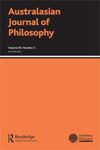健忘的第22条军规:心理错误的责任
IF 1
2区 哲学
0 PHILOSOPHY
引用次数: 2
摘要
归因理论家认为,性格信息会影响对指责的判断。但对于原因存在分歧。一个阵营认为性格信息是指责的基本决定因素。另一个阵营认为,性格信息只是提供了决定责任的心理状态和过程的证据。我们主张一种双通道的观点,即品格同时对罪责产生根本性和证据性的影响。在两项大型因子研究中(n = 495),参与者对某人犯错误(烧蛋糕或错过公共汽车站)时是否应该受到谴责进行评估。虽然心理状态的推论可以预测责备的判断,但性格信息却不能。通过中介分析,我们发现性格信息通过两个渠道影响责任(研究3-4;n = 447),它们对不同种类的信息都很敏感(研究5;N = 149)。一方面,健忘增加了对责任的判断,因为精神上的失误表明了一种令人讨厌的性格缺陷。另一方面,遗忘降低了对国家控制的判断,而国家控制又降低了对责任的判断。这两个渠道相互抵消,这就是为什么我们没有发现健忘对责任的总体影响。我们的研究结果挑战了品格信息在道德判断中的作用的几个基本假设,包括良好的品格通常会减轻指责。本文章由计算机程序翻译,如有差异,请以英文原文为准。
The Catch-22 of Forgetfulness: Responsibility for Mental Mistakes
Attribution theorists assume that character information informs judgments of blame. But there is disagreement over why. One camp holds that character information is a fundamental determinant of blame. Another camp holds that character information merely provides evidence about the mental states and processes that determine responsibility. We argue for a two-channel view, where character simultaneously has fundamental and evidential effects on blame. In two large factorial studies (n = 495), participants rate whether someone is blameworthy when he makes a mistake (burns a cake or misses a bus stop). Although mental state inferences predict blame judgments, character information does not. Using mediation analyses, we find that character information influences responsibility via two channels (Studies 3–4; n = 447), which are sensitive to different kinds of information (Study 5; n = 149). On the one hand, forgetfulness increases judgments of responsibility, because mental lapses manifest an objectionable character flaw. On the other hand, forgetfulness decreases judgments of state control, which in turn decreases responsibility judgments. These two channels cancel out, which is why we find no aggregate effect of forgetfulness on responsibility. Our results challenge several fundamental assumptions about the role of character information in moral judgment, including that good character typically mitigates blame.
求助全文
通过发布文献求助,成功后即可免费获取论文全文。
去求助
来源期刊

AUSTRALASIAN JOURNAL OF PHILOSOPHY
PHILOSOPHY-
CiteScore
2.60
自引率
0.00%
发文量
51
期刊介绍:
The Australasian Journal of Philosophy (AJP) is one of the world''s leading philosophy journals. Founded in 1923, it has been continuously published ever since. It is recognized as one of the best in the analytic tradition, but is not narrow in what it regards as worthy of acceptance. Heavily cited in the general philosophical literature, it is covered by all the major abstracting and indexing services, including the Arts and Humanities Citation Index® which provides access to current and retrospective bibliographic information and cited references found in the world''s leading arts and humanities journals. In addition to Articles and Discussion Notes, the journal publishes Book Reviews and Book Notes as well as occasional commissioned Critical Notices. The journal is read world-wide and has recently published contributions from North and South American, European and Asian as well as Australasian authors.
 求助内容:
求助内容: 应助结果提醒方式:
应助结果提醒方式:


